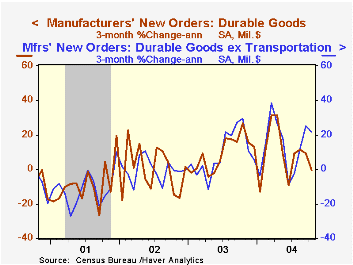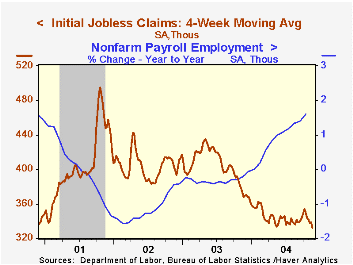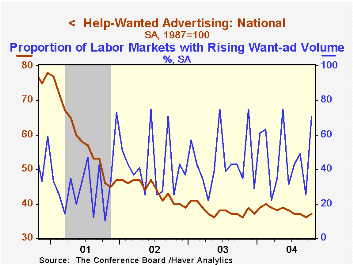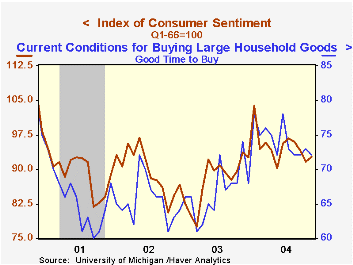 Global| Nov 24 2004
Global| Nov 24 2004New Home Sales Higher Still
by:Tom Moeller
|in:Economy in Brief
Summary
Sales of new single-family homes edged 0.2% higher in October to 1.226M following a 7.0% September gain that was double the initial indication. Consensus estimates had been for a decline in sales to 1.200M. Sales were mixed m/m around [...]

Sales of new single-family homes edged 0.2% higher in October to 1.226M following a 7.0% September gain that was double the initial indication. Consensus estimates had been for a decline in sales to 1.200M.
Sales were mixed m/m around the country. In the Northeast sales rose sharply for the third straight month but were down 3.4% y/y. In the West sales also rose sharply for the third consecutive month and were nearly a third higher than last October. To the downside were sales in the South by 9.1% (-4.9% Y/Y) and sales in the Midwest were off 3.6% (+8.4% y/y).
The median price of a new single family home jumped 9.1% m/m to $221,800 (14.3% y/y), near the record high.
| Homes Sales (000s, AR) | Oct | Sept | Y/Y | 2003 | 2002 | 2001 |
|---|---|---|---|---|---|---|
| New Single-Family | 1,226 | 1,224 | 7.4% | 1,089 | 976 | 907 |
by Tom Moeller November 24, 2004

Durable goods orders fell 0.4% in October led lower by declines in orders for motor vehicles and capital goods. A 0.5% gain in orders had been the Consensus expectation.
Nondefense capital goods orders dropped 3.3% as orders for computers & electronic products were dragged 5.7% (+3.7% y/y) lower by a 10.3% (+7.0% y/y) decline in orders for computers. Electrical equipment & appliance orders also were down by 3.5% (+2.2% y/y), the second consecutive monthly decline.
Transportation equipment orders rose 0.3% but the gain was wholly due to a 35.2% (-17.2% y/y) spurt in defense aircraft. Motor vehicle & parts orders fell 2.8% (-3.2% y/y) and nondefense aircraft orders fell 0.4% (-1.6% y/y) following huge declines during the prior two months. Durable goods orders less transportation fell 0.7% (+9.6% y/y).
Orders for machinery were again quite strong logging a 3.7% m/m gain (+24.7% y/y). fabricated metals orders also rose by 3.1% (+13.1% Y/Y).
Unfilled orders rose 0.6% (8.6% y/y) but the ratio of backlogs to shipments fell.
Inventories of durable goods 0.5% (6.5% y/y). The inventory to shipment ratio was about stable at 1.39, up from the low of 1.35 in March but well down from the highs near 1.7 in 2001.
| NAICS Classification | Oct | Sept | Y/Y | 2003 | 2002 | 2001 |
|---|---|---|---|---|---|---|
| Durable Goods Orders | -0.4% | 0.9% | 5.7% | 2.6% | -1.7% | -10.5% |
| Nondefense Capital Goods | -3.3% | 3.0% | 5.1% | 5.6% | -7.2% | -15.5% |
| Excluding Aircraft | -3.6% | 5.2% | 6.2% | 6.6% | -7.1% | -12.9% |
by Tom Moeller November 24, 2004

Last week, initial claims for unemployment insurance fell 12,000 to 323,000 from a little revised 335,000 the prior week. The Consensus expectation had been for 335,000 claims.
The four week moving average of initial claims fell to 332,000 (-9.7% y/y), the lowest level since November 2000.
During the last ten years there has been a (negative) 82% correlation between the level of initial claims and the y/y change in payroll employment.
Continuing claims for unemployment insurance fell 29,000 following a downwardly revised 24,000 drop the prior week.
The insured rate of unemployment remained at 2.2% for the seventh week.
| Unemployment Insurance (000s) | 11/20/04 | 11/13/04 | Y/Y | 2003 | 2002 | 2001 |
|---|---|---|---|---|---|---|
| Initial Claims | 323 | 335 | -10.8% | 402 | 404 | 406 |
| Continuing Claims | -- | 2,755 | -18.1% | 3,531 | 3,570 | 3,018 |
by Tom Moeller November 24, 2004

Mortgage applications plunged 5.7% last week for the second sharp w/w decline this month, but the average level of activity so far in November still was up 3.1% from October according to the Mortgage Bankers Association (MBA).
Purchase applications again fell sharply by 3.5%. Though the November average was up versus October, the latest weekly level was the lowest in the last four. During the last ten years there has been a 60% correlation between the y/y change in purchase applications and the change in new plus existing home sales.
Applications to refinance skid 8.3% w/w leaving the November average up 2.4% versus October.
The effective interest rate on a conventional 30-year mortgage fell to 5.92%. It averaged 5.92% in October. The effective rate on a 15-year mortgage also fell to 5.39%.
The Mortgage Bankers Association surveys between 20 to 35 of the top lenders in the U.S. housing industry to derive its refinance, purchase and market indexes. The weekly survey accounts for more than 40% of all applications processed each week by mortgage lenders. Visit the Mortgage Bankers Association site here.
| MBA Mortgage Applications (3/16/90=100) | 11/19/04 | 11/12/04 | Y/Y | 2003 | 2002 | 2001 |
|---|---|---|---|---|---|---|
| Total Market Index | 715.0 | 758.3 | -7.8% | 1,067.9 | 799.7 | 625.6 |
| Purchase | 463.3 | 480.3 | 0.7% | 395.1 | 354.7 | 304.9 |
| Refinancing | 2,179.3 | 2,375.4 | -16.6% | 4,981.8 | 3,388.0 | 2,491.0 |
by Tom Moeller November 24, 2004

The National Index of Help-Wanted Advertising published by the Conference Board rose slightly to 37 in October but has been moving sideways since 2Q 2003.
The proportion of labor markets with rising want-ad volume, however, more than recovered the prior month's plunge and jumped to 71%, the highest level since May.
During the last ten years there has been an 88% correlation between the level of help-wanted advertising and the year-to-year change in non-farm payrolls.
The Conference Board surveys help-wanted advertising volume in 51 major newspapers across the country every month.
| Conference Board | Oct | Sept | Oct '03 |
|---|---|---|---|
| National Help Wanted Index | 37 | 36 | 36 |
by Tom Moeller November 24, 2004

Though the November reading of Consumer Sentiment from the University of Michigan rose to 92.8, that was lower than the mid-month reading of 95.5 and indicated that Sentiment faded as the month progressed. Consensus expectations for a reading of 96.0 were disappointed.
During the last ten years there has been a 75% correlation between the level of consumer sentiment and the y/y change in real PCE.
The consumer expectations index rose 1.7% m/m (-3.3% y/y) and the current economic conditions index rose 0.7% (2.1% y/y), both off from the mid-month pace
Consumer sentiment amongst families earning more than $50,000 per year rose m/m but was down 2.0% y/y. Sentiment amongst families earning less than $50,000 per year fell m/m and fell 1.3% y/y.
The University of Michigan survey is not seasonally adjusted.The mid-month survey is based on telephone interviews with 250 households nationwide on personal finances and business and buying conditions. The survey is expanded to a total of 500 interviews at month end.
"Consumer Sentiment and the Media" from the Federal Reserve Bank of San Francisco can be found here.
| University of Michigan | Nov | Oct | Y/Y | 2003 | 2002 | 2001 |
|---|---|---|---|---|---|---|
| Consumer Sentiment | 92.8 | 91.7 | -1.0% | 87.6 | 89.6 | 89.2 |
| Current Conditions | 104.7 | 104.0 | 2.1% | 97.2 | 97.5 | 100.1 |
| Consumer Expectations | 85.2 | 83.8 | -3.3% | 81.4 | 84.6 | 82.3 |
Tom Moeller
AuthorMore in Author Profile »Prior to joining Haver Analytics in 2000, Mr. Moeller worked as the Economist at Chancellor Capital Management from 1985 to 1999. There, he developed comprehensive economic forecasts and interpreted economic data for equity and fixed income portfolio managers. Also at Chancellor, Mr. Moeller worked as an equity analyst and was responsible for researching and rating companies in the economically sensitive automobile and housing industries for investment in Chancellor’s equity portfolio. Prior to joining Chancellor, Mr. Moeller was an Economist at Citibank from 1979 to 1984. He also analyzed pricing behavior in the metals industry for the Council on Wage and Price Stability in Washington, D.C. In 1999, Mr. Moeller received the award for most accurate forecast from the Forecasters' Club of New York. From 1990 to 1992 he was President of the New York Association for Business Economists. Mr. Moeller earned an M.B.A. in Finance from Fordham University, where he graduated in 1987. He holds a Bachelor of Arts in Economics from George Washington University.
More Economy in Brief
 Global| Feb 05 2026
Global| Feb 05 2026Charts of the Week: Balanced Policy, Resilient Data and AI Narratives
by:Andrew Cates






